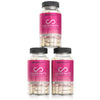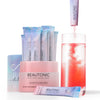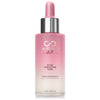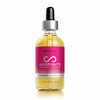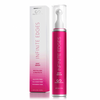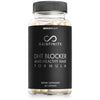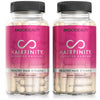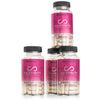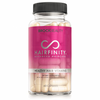
What are the Best Postpartum Hair Fixes?
A newborn baby brings all the happy moments to the family, especially the mom. Holding the baby for the first time, first feeding, watching it smile, and even using her tiny palms to hold you are amazing moments that fill the heart of every mom with happiness. But with these joys also come some post-pregnancy problems like abnormal cramps, sore nipples, constipation, fatigue, and dry hair after pregnancy which lasts for a few months.
After enjoying the long silky hair during pregnancy most nursing mothers experience drastic hair fall after delivery. This can be annoying especially as you'll wish to rock a long ponytail as you carry your beautiful baby.
If you have always wanted to understand the causes of postpartum hair loss, and how to control it, then you are at the right place. This guide will talk extensively about dry hair after pregnancy and all you need to know about it. Let's start!
What are the Causes of Postpartum Hair Loss?
Most expecting mothers enjoy long, thicker, fuller, and luscious hair during their pregnancy but once they've put it to bed, hair fall and dryness will set in. But what are the causes of this? Let's look at them:
-
Nutritional Deficiencies
The growth of fuller and thicker hair is significantly affected by proper nutrition. Low amount of calorie and micronutrients deficiencies due to medical conditions, dietary practices, and genetic disorders lead to dry hair after pregnancy:
After delivery, some women go on crash diets to lose the extra pounds added during pregnancy. This leads to a deficiency in nutrients like proteins which help in maintaining healthy hair follicles. Ingesting an adequate amount of proteinaceous foods ensures that the body receives the necessary amount of amino acids to promote the growth of healthy and thicker hair.
Iron deficiency is another cause of hair problems after delivery. Post-pregnancy exposed women to a lack of iron or ferritin due to heavy bleeding or multiple births. This can last for as long as 12 months making it one of the worst causes of hair fall after delivery.
Lack of enough biotin in the body after delivery also causes hair thinning and dryness as well as rashes around the mouth, nose, and eyes.
While nutrient deficiency can cause hair fall, over-supplementation of certain nutrients like vitamin A, vitamin E, and Selenium used for hair growth can lead to hair dryness after pregnancy.
-
Polycystic Ovary Syndrome (PCOS)
Polycystic ovary syndrome is a hormone disorder that affects women. Normally, in adult women, the ovary follicles rupture each month and release an egg but when there's PCOS, these follicles continue to grow and turn into cysts then start releasing androgen into the body.
This syndrome has many symptoms from irregular periods and diabetes to hirsutism (excess hair in the face and other parts). Surprisingly, some PCOS patients experience hair loss and thinning around their scalps which is referred to as female pattern hair loss.
The excess secretion of androgen is what causes dryness of the scalp, hair thinness, breakage, and dryness. Seeing a doctor check up on this can help reduce postpartum hair loss.
-
High-Stress Levels
One of the most common causes of hair fall is excessive stress. High-stress levels push the hair follicles to the Telogen (resting) phase.
After birth, most mothers are exposed to the stress of looking after their baby and when they resume work, things become too much for them leading to chronic stress. Within a few months, you'll notice excess hair in the shower, on your comb, and your pillow. Managing your stress levels can help stop hair loss and thinning.
-
Thyroid Issues
When left untreated, hyperthyroidism and hypothyroidism can cause hair loss, especially after delivery. This hair loss is usually severe including the entire scalp making it look very sparse. This can easily be treated by taking hyperthyroidism or hypothyroidism medications.
-
Birth Control Pills
Most women take birth control pills after delivery to avoid getting pregnant again. Women who are sensitive to the hormones in the tablets or who have a hormone-related hair loss in their genes may experience dryness and hair loss as a result of taking these pills.
Birth pills cause hair to move to the telogen phase earlier and stay on it for a longer time. This leads to a form of hair loss known as telogen effluvium. A lot of hair can fall during this process if care isn't taken.
Fortunately, hair loss caused by birth pills is usually temporary and tends to stop once your body gets used to the pills or once you stop using them.
-
Lack of Sleep
Lack of a peaceful night's rest has a lot of negative impacts on the body, one of which is chronic stress. Prolonged lack of sleep affects the normal functioning of the body resulting in hair loss, hair thinning, and breakage.
New moms usually don't have enough sleep due to the baby's cry, this can cause postpartum hair loss. Seeking help from your partner or other family members to take care of the baby can help you have some more hours of sleep.
-
Harsh Hair Styling Products and Tools
Excessive use of hot styling tools like hair dryers, curling iron, and straighteners can make the hair dry and prone to breakage.
Also, the use of harsh hair styling products leads to loss of hair elasticity, making hai have split and thin ends.
Since postpartum comes with many challenges that expose hair to thinning and breakage, using these tools and products after delivery, exposes you to the risk of dry hair after pregnancy.
-
Side Effects of Some Medications
Another cause of dry hair after pregnancy is the effect of some medications that alter the normal hair growth cycle. Medications typically cause two types of hair loss - anagen effluvium and telogen effluvium.
Anagen Effluvium usually occurs during the growth phase of hair. This type of hair breakage usually occurs within the first few days or weeks of drug intake. It is commonly seen in people taking cancer drugs. On the other hand, telogen effluvium usually appears months after taking drugs and it's the most common form of hair loss caused by medications.
When Does Postpartum Hair Thinning Start?
The time at which thinning and drying of hair after pregnancy starts varies from one woman to another. Generally, postpartum hair loss can begin anytime after you've your baby and reach a peak after 4 months.
If your baby is a few days old and you start noticing clumps of hair on your comb, don't panic your hair is probably in the resting phase, and it will return to the growing phase in no time. Postpartum hair loss is very frustrating but with patience and the right treatments you'll be able to overcome it within a short period.
Mostly, dry hair after pregnancy grows back in a year or less after delivery. However, we can't have you waiting for your hair to grow back without doing anything, below are some postpartum hair fixes you should give a try!
Best Postpartum Hair Fixes
We know its hard to find time to do anything when you have a newborn, especially crafting several well-balanced meals a day with hair healthy foods. An easy way to make sure you're hair is getting all the nutrients it needs is by taking a quality hair-specific multi-vitamin like Hairfinity Healthy Hair Vitamins. Be sure to check with your doctor before taking any multi-vitamin if you are breastfeeding.
-
Increase Intake of Fruits and Berries
Fruits and berries are a good source of hair growth nutrients. They provide your hair with the required vitamins and minerals to get the essential nourishments. There are a lot of fruits and berries you can take to enhance the growth of your hair and make it shinier, stronger, and thicker. They include apples, apricots, bananas, kiwi, pawpaw, oranges, grapes, raspberries, blackberries, strawberries, blueberries, and many more.
These foods are loaded with nutrients, antioxidants, vitamins, and minerals that provide the hair follicles with the nourishment it requires and also helps in promoting blood circulation around the scalp.
-
Sweet Potatoes
Sweet potatoes contain a high amount of Beta-carotene - a nutrient that our body transforms into vitamin A. Beta-carotene improves the growth of cells and prevents hair thinning and dullness. It is also a rich source of copper, iron magnesium, and potassium.
There are many ways you can use sweet potatoes to fix postpartum hair fall. You can make potato juice and use it to wash your hair to restore its thickness and volume. You can also consider adding sweet potatoes to your diet.
-
Nuts
Another good way to fix dry hair after pregnancy is by eating nuts. Walnuts, Brazil nuts, pecans, almonds, and cashew nuts are good sources of zinc that are very essential for the growth of a full thicker hair.
Walnuts in particular are rich in omega-3-fatty acids and alpha-linoleic which act as a natural hair conditioner, thereby strengthening hair follicles and scalp.
Adding a dose of nuts to your diet will help in reducing postpartum hair thinning and dryness and also promote the growth of a thicker lock.
-
Fishes, Shrimps, and Oysters
Seafood is a good source of proteins, B vitamins, Vitamin D3, omega-3-fatty acids, and selenium, which all help in promoting the growth of stronger and thicker hair. They're also rich in antioxidants that help in fighting free radicals and promote scalp health.
Fatty fishes like tuna, herring, sardines, and salmon promote hair growth while shrimps and oysters are a good source of B vitamins, iron, zinc, and other nutrients that promote hair growth.
-
Eggs
Eggs are highly rich in biotin and protein - essential nutrients that help in producing keratin thereby reducing postpartum hair loss and promoting hair growth. They're also highly rich in vitamin B12, vitamin D, selenium, zinc, and other nutrients which increase hair health.
-
Coconuts
Coconuts are another effective remedy for postpartum hair fall. They can be used in many ways - you can apply coconut milk to the scalp to promote scalp health. You can also burn its shell and add the ashes into your hair oil.
You can also add coconut juice and other coconut-related meals to your diet. Regular use of coconut has been linked with promoting the growth of darker, silkier, and stronger hair.
-
Avoid Harsh Styling Tools
Stay away from hot tools and colors when styling your hair. Frequent use of these tools and colors makes hair weaker and more exposed to breakage.
Also, reduce the use of a blow dryer when you wash your hair as it weakens the roots of your hair. Rather allow your hair to dry naturally. Moreover, avoid combing your hair when it's wet except if you're going to use a wide-toothed comb.
When experiencing postpartum hair loss, it's recommended you also stay away from hair sprays and gels.
Best Home Remedies For Postpartum Hair Fall
Apart from improving your diet, there are also some simple home remedies you can try out to bring back your thick and healthy mane. Check them out below:
-
Egg and Olive Hair Pack
Mix 2 egg whites with 3 tbsp of olive oil and apply on your hair for about 30 minutes then rinse with lukewarm water.
Do this treatment twice a week and watch as you defeat postpartum hair fall and regain your shiny elastic locks.
-
Fenugreek Seed Extract
Soak fenugreek seeds in water overnight. Strain the water in the morning and apply it to your hair. Leave it for 1 to 2 hours then wash with a natural shampoo.
Fenugreek seeds help in making your hair stronger and fighting off dandruff if there's any. Do this process twice a week for better results.
You can also grind fenugreek and add it to your hair oil for an effective cure against postpartum hair fall.
-
Indian Gooseberry Oil
Also known as Amla, Indian gooseberry has been used for so many years in treating hair problems. Boil this powerful tonic with an essential oil until it turns black then massage it through your hair making sure you've reached the scalp.
You can also consider adding an amla juice to your diet to fix dry hair after pregnancy.
Takeaway
Thin and dry hair after pregnancy can be frustrating especially after enjoying a thicker mane during pregnancy days. Thankfully, this condition isn't permanent and with the right remedies, you'll be able to regain your full and thick lock in no time. However, if postpartum hair fall persists, consider seeing a professional for treatment.
















